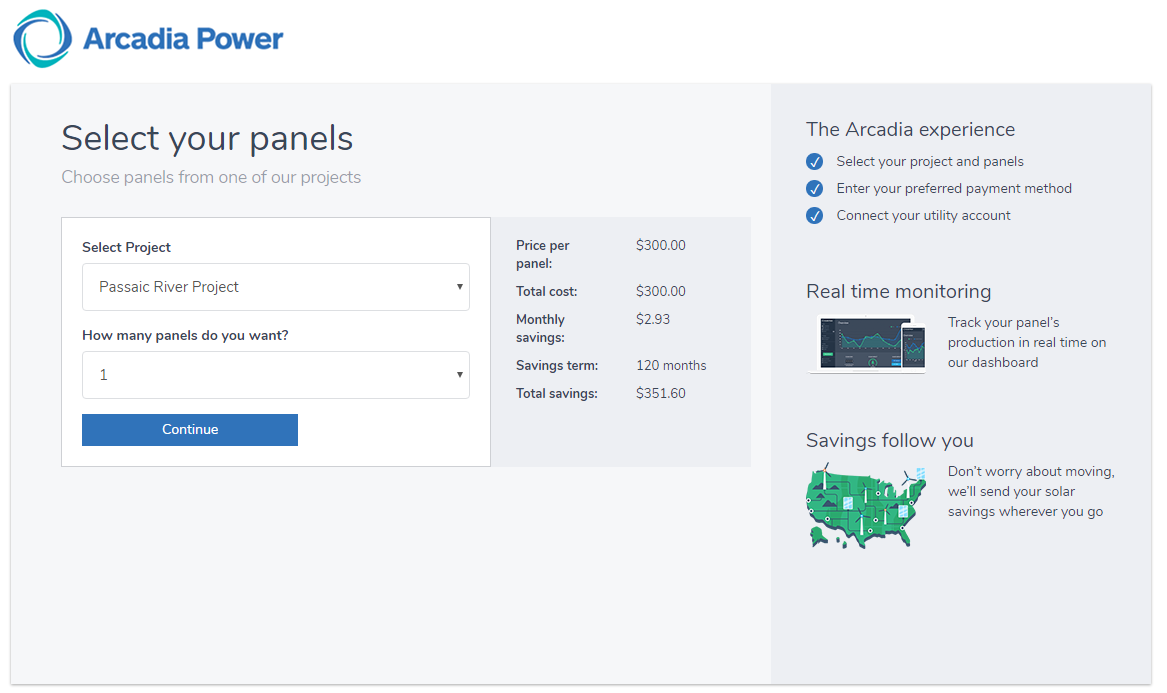Home /
Money Blog
Buying Solar Cells for Passive Income
Note: You can use any financial calculator to do this problem, but if you want the BEST, you can
get our
10bii
Financial Calculator for iOS, Android, Mac, and Windows!

THE SCENARIO
In 2016, I ran across a company called
Arcadia Power* that lets you transition 50% or 100% of your electricity usage to wind power. Since the 50% option didn't increase my bill at all, I decided to give it a shot, and it's worked so well that everything has been the same on my end (except that their auto-pay was easier to set up than Southern California Edison's had been).
Last week, they started up a new program where you can purchase solar cells located in various places around the US, and the electricity the cells generates defrays your own electricity expenses. It's an interesting concept to a high-rise dweller like me, as I'd like to use solar power, but I don't have a roof to put solar cells on. Even if I did have a roof, the program is interesting because the solar power would follow me even if I moved (it's tied to my Arcadia account, not the physical location of my home, and my Arcadia account follows me wherever I move).
Looking into the
page they set up about the program, the offer is as follows:

I'm interested in using renewable energy sources, and I'm interested in making money through investing, and this seems to be a way to do both at once... the question that remains, then, is 'what's the return on my investment if I buy one of these solar panels?'
* Full disclosure: This is a referral link, so if you sign up with Arcadia Power, you'll get a billing credit and so will I. If you don't like using referral links, feel free to use
this link instead.
THE SOLUTION
First things first, make sure the calculator is using 12 Payments per Year.
Each solar cell I buy will look like this.
N: 120
I/YR: (this is what I'm trying to find)
PV: -300 (the cost of purchasing one panel)
PMT: 2.93 (the monthly energy savings from one panel)
FV: 0
If I buy solar cells, I get a 3.24% return on my investment.
If a 3.24% return is good enough for me, or if the combination of 3.24% return and the environmental/societal benefits of supporting solar power over non-renewable energy sources is sufficiently compelling, this seems like an investment that could work well. I'd obviously need to read the fine print if I wanted to proceed, but if the numbers of an investment don't work, there's no reason to conduct the rest of the 'due diligence'.

 I'm interested in using renewable energy sources, and I'm interested in making money through investing, and this seems to be a way to do both at once... the question that remains, then, is 'what's the return on my investment if I buy one of these solar panels?'
* Full disclosure: This is a referral link, so if you sign up with Arcadia Power, you'll get a billing credit and so will I. If you don't like using referral links, feel free to use this link instead.
I'm interested in using renewable energy sources, and I'm interested in making money through investing, and this seems to be a way to do both at once... the question that remains, then, is 'what's the return on my investment if I buy one of these solar panels?'
* Full disclosure: This is a referral link, so if you sign up with Arcadia Power, you'll get a billing credit and so will I. If you don't like using referral links, feel free to use this link instead.